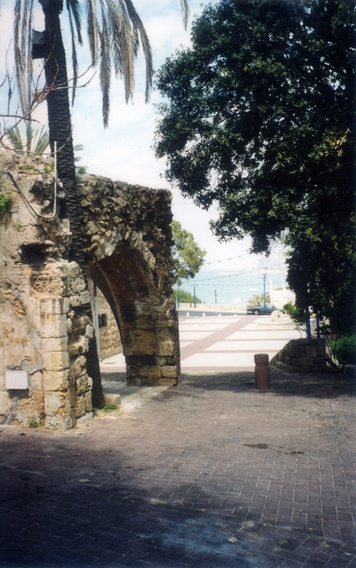
Jaffa
|
 Jaffa |
| 'Nadia al-Quds', Jaffa, April 9:
|
|
'Nadia' is one of the few speakers who asks me not to gave her real name. This is understandable from the degree her family has been involved in politics. She has daughters in university, doesn't want them to be harmed by anything she says. Since a detailed description might help her identification, I will say no more than that this was an extremely valuable recording, throwing light on life in Nazareth in the 1950s and 1960s under military occupation.
'Nadia al-Quds' begins speaking: |
in Menshiyyeh. And of course at the beginning of the occupation, the Israeli Army began gathering the strugglers, they imprisoned them. They exiled them to Abu Argayla (?). My father was one of the strugglers, and they took him and exiled him to Abu Argayla."
April 9: My stay in Jaffa is over. I pack and leave for the bus station. By 4.30pm I'm in Jerusalem, back at Rema and Alex's home. We watch films about pre-1948 Yafa. One of them is Najwa Nassar's 'Na'im and Wadi'a'. Rema will use them in a presentation she is giving at Florence, to a panel on women and 'the home', pointing out the way that nationalist ideology frames films so that they can be 'read' for public ideas about gender. Thus in Palestinian films peasant women rarely speak because in nationalist ideology they represent the land. But middle class women do speak, and it is through them that nationalism makes its claims to modernity. My travel month is more than half over, I must head north. Though I know it's not possible, I'm still hoping to record in the main towns and some of the villages of Galilee. As a first step I phone to Muhammad Zeidan, head of the Human Rights Association in Nazareth. He says there's a pending house demolition in Umm al-Fahum, he can arrange for me to record with the home-owner's wife. To my great relief, the beautiful and conveniently placed Soeurs de Nazareth convent has room for me. I leave Jerusalem at midday, Monday April 10th, take a bus from the Egged station in West Jerusalem to Haifa, then another to Nazareth, and arrive soon after 4pm. |
[Hikmet Bawab] [Umm Ra'ed, Umm al-Fahum] Copyright©2005 |
|